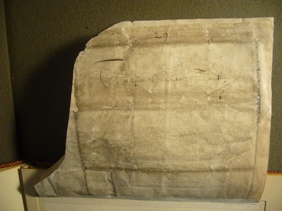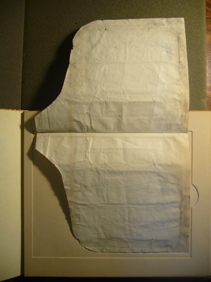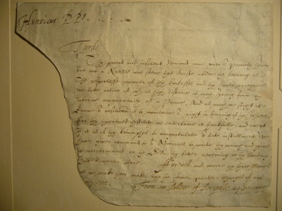Letter from Henry, Prince of Purpoole, to the Great Turk (Folger MS V.a.190)
Historical Records
Folger Shakespeare Library MS fragment
(Reproduced by permission of the Folger Shakespeare Library)
Two small leaves exist as Folger MS. V.a.190:

|

|

|
| Folger V.a.190, cover: "29. To ye Greate Turke" | Folger V.a.190, reverse (blank) | Folger V.a.190, letter |
The Letter from Henry, prince of Purpoole, to the Great Turk contains two leaves, one marked with the addressee ("To ye Greate Turke"), the other bearing the contents of the letter itself. The letter reads:
Henricus PPs
Turke
Thy proud and insolent demand came into our Princly hands but not a Nuntio was seene that durste avowe the bearing of it. The respecless manner of thye Embassee and thy hauty arrogance we take notice of with as high disdaine as may spring from the inborne magnanimity of a Prince, And as much we slight it: Knowe our resolucion is to maintaine our right in bearing of the Crescent. ffor thy threatned hostility we entertaine it thankfully, and accept of it as of thy triumphes to congratulate our Late installment. We have given command to our Admirall to waite thy coming and give the entertainment on the Sea, thy better receiving at thy landing shalbe our neerer Care. ffarewell and weare thy three Moones till we make them make upp the fower quarter = Changes of our Crescent.
From our Pallace of Portpoole.
27. December
Theatrical Provenance
The Folger catalogue entry (following Axton 85) notes that "[a] Henry Helmes was prince of Purpoole in the 1594 Christmas revels" and suggests that this fragment was "[p]robably part of the entertainment provided in the Gesta Grayorum, 1594-1595." If so, it would have been performed by the Gentlemen of Gray's Inn.
Probable Genre(s)
Royal Entertainment / masque (if part of the Gesta Grayorum).
Possible Narrative and Dramatic Sources or Analogues
Gesta Grayorum, or, The history of the high and mighty prince, Henry Prince of Purpoole ... who reigned and died, A.D. 1594 : together with a masque, as it was presented (by His Highness's command) for the entertainment of Q. Elizabeth, who, with the nobels of both courts, was present thereat. (London: Printed for W. Canning, 1688).
References to the Play
No references to this "letter" known.
Critical Commentary
The Folger catalogue entry notes that this fragment is "Not included in Gesta Grayorum, 1688, nor in J. Nichols’ Progresses of Queen Elizabeth, nor in Gesta Grayorum, edit. by Desmond Bland, 1968."
Chambers (1.168) describes the Gesta Grayorum as a "very magnificent Shrovetide mask" that "was brought to Court by the men of Gray's Inn, as a wind-up to their notable Christmas revels under the Prince of Purpoole." He observes that the "songs and speeches ... can be assigned respectively to Thomas Campion and Francis Davison." He explains that the Gesta Grayorum "is a narrative of the reign of a Christmas Prince, or Lord of Misrule ... appointed at Gray's Inn for the Christmas of 1594. The Prince was a Norfolk man, Henry Helmes, and a list of the members of the Inn who held positions at his court is given in the tract. The revels began on St. Thomas's Eve, 20 Dec., continued until Twelfth Night, were resumed at Candlemas, and again at Shrovetide, when the Prince's reign terminated" (4.55-56).
Nelson and Elliott reproduce the letter in their Inns of Court volume for REED (435-36), noting:
The context of the letter is described in the Gesta, which does not, however, contain the text. The ‘Turk’ is imagined as an enemy not so much of Gray’s Inn as of the Inner Temple, then visiting in the person of an ambassador from ‘Frederick Templarius, their Emperor, who was then busied in his Wars against the Turk’ (p 395, ll.29–30). It seems likely that this very document was read aloud during the course of the Gray’s Inn Christmas Prince revels by Henry Helmes, Prince of Purpoole. (364)
For What It's Worth
The Gesta Grayorum has often been ascribed to Francis Bacon, Francis Davison and others; it is not clear who may have authored the fragment comprising Folger MS V.a.190.
Works Cited
Site created and maintained by David McInnis, University of Melbourne; updated 17 April 2012.